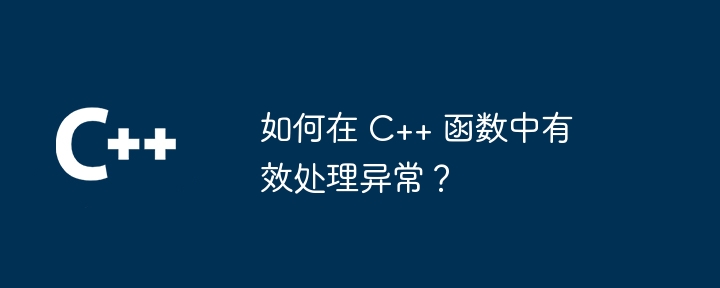Home >Backend Development >C++ >How to effectively handle exceptions in C++ functions?
How to effectively handle exceptions in C++ functions?
- WBOYWBOYWBOYWBOYWBOYWBOYWBOYWBOYWBOYWBOYWBOYWBOYWBOriginal
- 2024-04-24 09:09:01626browse
Exception handling is a feature in C that handles errors gracefully. It involves exception throwing and catching: Exception throwing: Use the throw keyword to throw an exception explicitly or let the compiler throw an exception automatically. Exception catching: Use the try-catch block to catch exceptions and perform exception handling operations. Practical combat: In the divide function, throw the std::invalid_argument exception to handle the case where the divisor is zero. Tip: Use exception specifications, catch only the exceptions you need, log exceptions, and use rethrows where appropriate.

#How to effectively handle exceptions in a C function?
Exception handling is an important feature in C that allows a program to recover or terminate gracefully when an error or unexpected event occurs. Proper handling of exceptions is crucial as it prevents your program from crashing and maintains its robustness.
Exception handling mechanism
In C, exceptions are essentially classes, derived from the std::exception class. When a function throws an exception, it throws an object of that class or its subclasses. You can throw exceptions explicitly by using the throw keyword, or you can have the C compiler throw exceptions automatically when certain errors occur.
Catch exceptions
You can use the try-catch block to catch exceptions. The try block contains code that may throw an exception, while the catch block (which exists after the try block) is used to catch any thrown exception and take appropriate action .
try {
// 可能引发异常的代码
}
catch (std::exception& e) {
// 捕获异常并采取操作
}Practical case
Let us consider a function divide that divides two numbers and returns the result. This function may throw an exception if an attempt is made to divide by zero.
int divide(int a, int b) {
if (b == 0) {
throw std::invalid_argument("除数不能为零");
}
return a / b;
}When calling the divide function, we can use the try-catch block to handle potential exceptions.
int main() {
try {
int dividend = 10;
int divisor = 5;
int result = divide(dividend, divisor);
std::cout << "结果:" << result << std::endl;
}
catch (std::invalid_argument& e) {
std::cout << "错误:" << e.what() << std::endl;
}
return 0;
}Tips and Suggestions
- Always use an exception specification: It informs the compiler of the types of exceptions that the function may throw, thereby Improve code readability and security.
-
Catch only the exceptions you need: Do not use a generic exception handler (i.e.
catch (std::exception&)) as it will catch all exceptions, which may Important errors can be masked. - Logging and reporting of exceptions: This helps in debugging and analyzing the program when problems occur.
- Use rethrow where appropriate: If you catch an exception but cannot handle it, you can rethrow it to let the upper handler handle it.
The above is the detailed content of How to effectively handle exceptions in C++ functions?. For more information, please follow other related articles on the PHP Chinese website!

